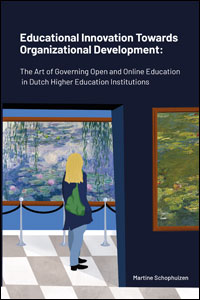 Forms of open online education can bring about innovation in teaching and learning. Yet there is still little sign of this transformation at higher education institutions. How can open online education innovations be embedded in higher education institutions? And what organisational preconditions for open online education exist at various levels? On Friday 18 February 2022 at 4 pm, Martine Schophuizen defended her thesis entitled “Educational innovation towards organizational development: the art of governing open and online education in Dutch higher education institutions” at the Open Universiteit in Heerlen.
Forms of open online education can bring about innovation in teaching and learning. Yet there is still little sign of this transformation at higher education institutions. How can open online education innovations be embedded in higher education institutions? And what organisational preconditions for open online education exist at various levels? On Friday 18 February 2022 at 4 pm, Martine Schophuizen defended her thesis entitled “Educational innovation towards organizational development: the art of governing open and online education in Dutch higher education institutions” at the Open Universiteit in Heerlen.
Open Online Education (OOO)
For years, there have been high expectations regarding the potential of forms of open online education (OOO), for example, Massive Open Online Courses (MOOCs). However, research into the effects of OOO still provides too few insights into increasing the quality and accessibility of higher education, and into the internal organisation of educational institutions to make this possible. Martine Schophuizen, therefore, examined the organisational challenges and opportunities of OOO educational innovations in order to gain a better understanding of how to adopt, implement, and embed innovative forms of education in the long term.
A clear vision of learning in the future
The results of the study point to, among other things, a skills gap among instructors as regards designing and teaching in OOO forms. There also appears to be a lack of central support for the development of OOO. More guidance and support are needed in order to deliver high-quality OOO. The successful implementation of OOO requires adjustments to the internal organisation, initiatives to raise awareness, the appropriate organisation of support systems (informal and formal), as well as new forms of leadership. This can be achieved by developing a clear vision of learning in the future, the place of OOO in that vision, and structural coordination and implementation of that vision in institutional strategy, policy and practice.
Educational innovation requires attention at all levels
Managing higher education institutions in terms of educational innovation is thus a complex challenge involving many actors. It involves a great need of resources, various rules and requirements, different organisational structures, organisational cultures and ways of working. The studies in Martine Schophuizen’s dissertation show that managing educational innovation, therefore, requires careful and appropriate attention at all levels of the higher education system.
Martine Schophuizen’s doctorate
Martine Schophuizen (1986, Eindhoven) is an educational researcher at TNO and holds a PhD from the Education Sciences faculty of the Open University. She defends her thesis ‘Educational innovation towards organizational development: the art of governing open and online education in Dutch higher education institutions’ at the Open University in Heerlen on Friday 18 February 2022 at 4 pm. The dissertation is part of the SOONER project. The aim of this project is to make a scientific contribution by developing empirical evidence about the conditions for and effects of online open education. The supervisor of Martine Schophuizen is Professor Marco Kalz, Open University and Heidelberg University of Education. Co-supervisor is Professor Marcus Specht, TU Delft. Professor Hendrik Drachsler has been participating as an opponent in the PhD defence committee.
